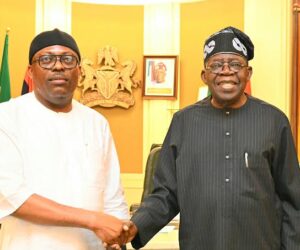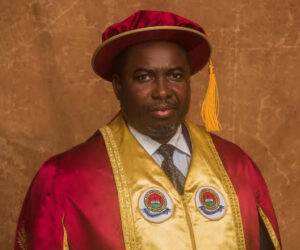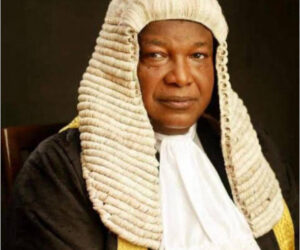1
Prince Adewole Adebayo, an international lawyer and the presidential candidate of the Social Democratic Party (SDP) in the 2023 election, in this interview speaks on Nigeria’s rule of law, the ideological roots of the SDP, the leadership crisis confronting the nation, and the recurring failure of political actors to uphold justice and integrity in governance. He also reflects on corruption, the economy, and the moral decline he believes is at the heart of Nigeria’s woes.
You’ve often said that rule of law should not be treated as a political slogan. What exactly do you mean by that?
We are probably one of the few countries in the world that are still campaigning about corruption. The fact that we need to be united around certain principles like fairness, justice, equity, and rule of law should not make them political programmes.
Rule of law cannot be manifesto. Rule of law has to be basic, what everybody has to follow. It should not depend on who is president or what party is in power. Once you say you believe in democracy, then you are bound by the rule of law, justice, and equality. These are not political promises; they are duties.
How do you describe the ideology of the Social Democratic Party and what makes it different?
The SDP is a continuation of the same vision that produced Nigeria’s best political thinkers. We call it the “little-to-the-left” principle, meaning we lean toward social justice and welfare.
Everything you find in Chapter Two of the Constitution; the Fundamental Objectives and Directive Principles of State Policy is what you find in the SDP. We believe government must be responsible for the welfare of the people, the provision of education, health, and housing, and the protection of rights.
Our founding fathers believed that government must be the protector of the weak. That is what we stand for not propaganda or self-enrichment, but justice and equal opportunity.
What inspired the formation of the SDP and its guiding political values?
It goes back to the 1979 Constitution. We had a beautifully written Constitution where Chief F. R. A. Williams was chairman of the drafting committee, and very sound constitutional lawyers joined him. That Constitution reflected the moral vision of leaders like Awolowo and Azikiwe, that the purpose of politics is to improve human welfare. The SDP was built to advance those ideas, to make sure government policies align with fairness and social justice. When we ignore those values, politics becomes an enterprise of greed. That is why we are where we are today.
Looking at Nigeria’s democracy today, how would you describe its journey since independence?
When the First Republic began, it was built on federal principles and moral discipline. The political class then, Awolowo, Azikiwe, Ahmadu Bello understood the value of law and order.
In the Second Republic, we had the famous two-third (2/3) case. The Supreme Court decided who truly won the presidential election between Awolowo and Shagari. That shows that even at that time, the judiciary was central to democracy. But over the years, we have politicised the courts, weakened our institutions, and elevated self-interest above national interest. Democracy has become an opportunity for sharing spoils instead of serving people.
How do you view the state of leadership and governance in Nigeria today?
Our biggest problem is moral collapse. We know what is right but refuse to do it. We are not short of laws; we are short of discipline. Every time we drift into crisis, it is because people in leadership positions choose convenience over conscience. Until we restore moral leadership , guided by truth and fairness, Nigeria will keep moving in circles. Leadership is not about managing poverty; it is about eliminating the causes of poverty. It is not about fighting opponents; it is about fighting injustice.
What are your thoughts on corruption and the way it’s being fought by successive governments?
Every decent person knows that corruption is bad. There is no religion or philosophy that supports it. So, when people campaign that they will fight corruption, I ask: who among them is campaigning for corruption? Nobody.
The problem is not in saying corruption is bad; it is in building a system that makes it impossible to thrive. You don’t need to campaign about corruption if your institutions are functional. The moment the rule of law is strong, corruption automatically reduces.
We must return to the basics fairness, transparency, and respect for due process. Without that, anti-corruption campaigns are just slogans.
You once said that Nigeria’s current problems began after the civil war. Can you explain what you meant?
The civil war was a very brutal one. Many people were killed and properties were destroyed. There were victims of unlawful killing, rape, robbery, and maltreatment, yet there was no compensation, no inquiry, and no justice.
The phrase “no victor, no vanquished” sounded noble, but in reality, it meant no accountability. That was the beginning of impunity in Nigeria. Once people saw that crimes could be committed on a national scale without consequence, lawlessness became normal. From that point, every form of corruption and injustice found justification in the idea that nothing ever happens to those who offend the law.
What is your assessment of Nigeria’s economy and the way it is being managed?
The economy is being mismanaged because there is no accountability. At one point, 80 percent of our crude oil was being stolen. The same thing happens in solid minerals — over-invoicing, under-declaration, and waste.
When government agencies operate outside the law, the economy becomes a playground for thieves. Economic crimes are not just moral issues; they are legal violations. If we enforce our existing laws faithfully, most of these leakages will disappear.
Some critics say ideology no longer wins elections in Nigeria. What do you say to that?
I disagree. Ideology is what gives politics meaning. Without ideology, you have no compass. When people say ideology does not win elections, I tell them that lack of ideology is what has kept Nigeria stagnant. The SDP believes in building from the foundation. We are not trying to win power for its own sake; we are trying to make power meaningful again. If you win an election and lose your soul, you have lost everything.
What kind of reforms would you prioritise if you had the opportunity to govern?
First, we must strengthen the independence of the judiciary. Judges must not owe their appointments or welfare to politicians. Second, we must make Chapter Two of the Constitution justiciable. The directives on education, health, and social welfare should not be treated as mere advice — they should be enforceable rights. Third, we must rebuild our institutions so that no one is above the law. Once the law applies to everyone, every other sector will work as it should.
What message do you have for Nigerians who still believe in change despite the challenges?
My message is simple: this country can still be great. But we must stop pretending that progress will come without sacrifice. We must choose leaders who respect the law, who tell the truth, and who understand that power is a trust, not a privilege. If we return to the Constitution, to those principles of justice and equity that our founders wrote down, Nigeria will rise again. It may take time, but it is possible because the foundation is still there.







